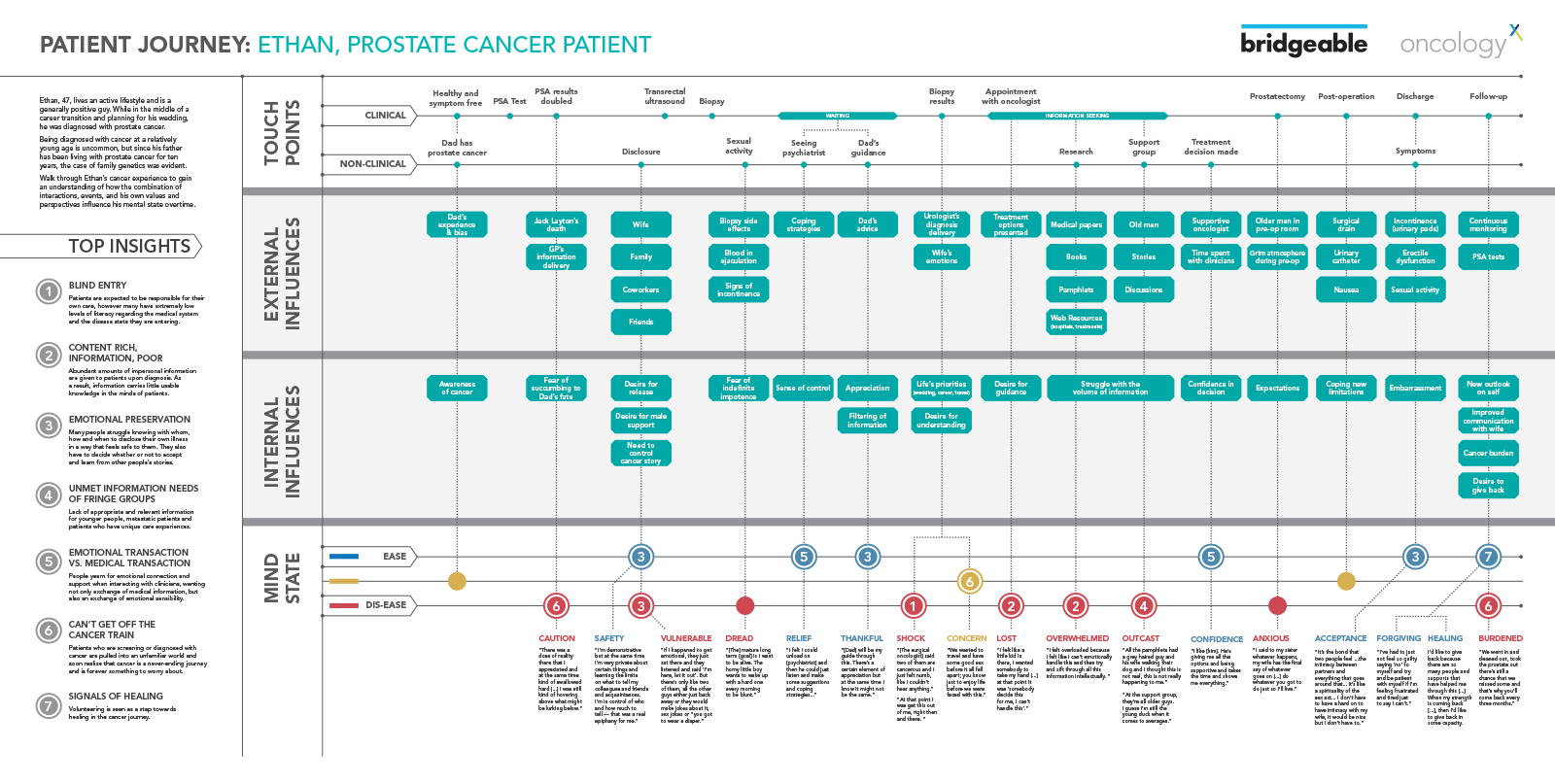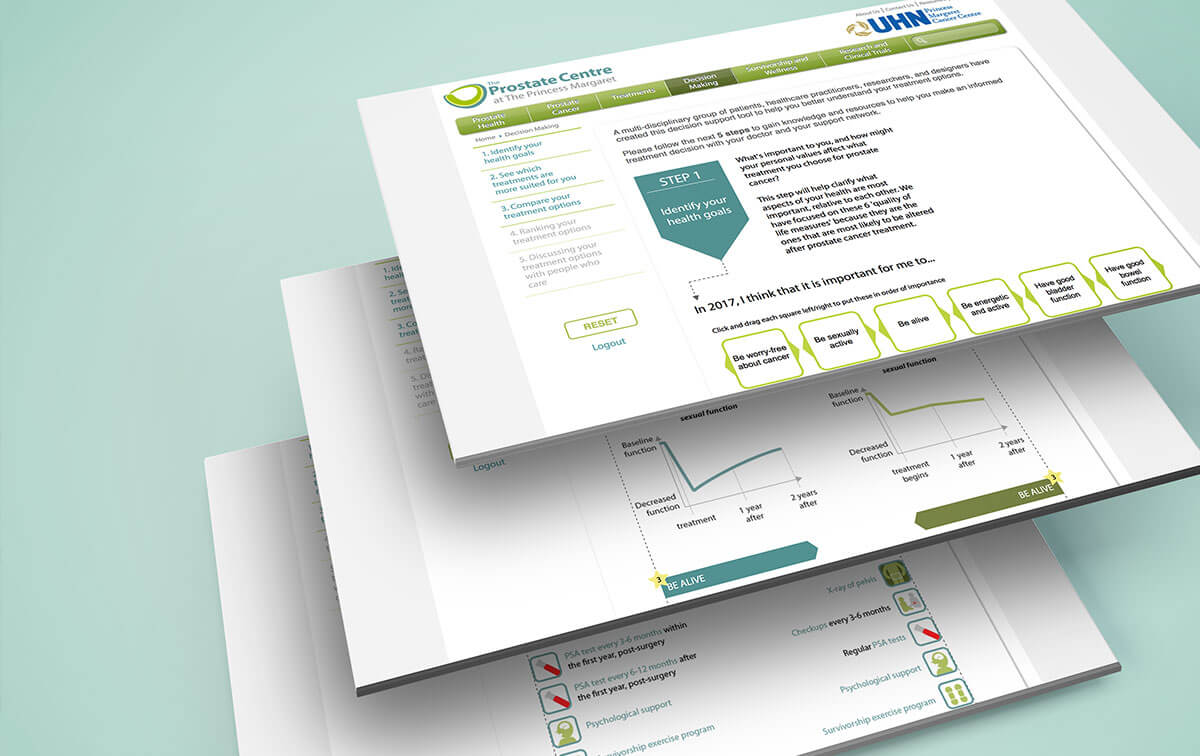
Work Bridgeable
Helping cancer patients make treatment decisions
Problem
How to help newly diagnosed prostate cancer patients choose among a vast and often confusing array of therapeutic options at a sensitive moment in their journey
Solution
TheraChoice, a decision support tool for prostate cancer patients built upon a foundation of patient insight research and biomedical communications expertise
Impact
The tool is designed to allow patient users to review clinically appropriate treatment options in a way that may lessen their anxiety around the decision-making process and decrease post-therapy decisional regret
Author
- Bridgeable
Client
- Princess Margaret Cancer Centre
An overwhelming diagnosis
Every day, thousands of newly diagnosed prostate cancer patients, emotionally overwhelmed upon learning of their illness, are tasked with making an informed decision about their next step: treatment. The “right choice” for an individual patient is dependent on the specifics of their condition as well as their values and expectations, but conversations between patients and providers about these choices are often difficult, and patients often lack access to comprehensive information about their treatment options.
Doctors often suggest a particular course of treatment to patients without informing them of alternatives, and many patients quickly accept their recommendations. In other cases, patients receive information on a range of treatment options from their healthcare providers, but this information is often not presented in a way that allows them to easily understand and compare their options. Still, other patients are left unsupported as they perform research on their own. These patients must wade through a thicket of information describing a disease that is new to them while also weighing therapeutic options, their related clinical outcomes, and their associated side effects. But even patients who receive information from healthcare providers or perform independent research don’t always have the opportunity to learn about all their treatment options.

Gathering insight into the patient decision-making process
Bridgeable worked with Princess Margaret Cancer Centre to find a way to better assist patients in making an informed decision at this critical moment.
We conducted in-home ethnographies with prostate cancer patients to learn about the patient journey, including past experiences and current perceptions of treatment decision-making. We also hosted interviews with healthcare providers and subject matter experts to understand the professional support network’s view of cancer treatment decision-making and the role of HCPs within the process.
A literature review of peer-reviewed articles in medicine (e.g., clinical practice guidelines), social science (patient and HCP experience), and communication design (risk, data visualization, health) supported and provided context for our in-field work.

Mapping the patient journey
Distilling the insights we gathered in our research, we created a patient experience map that highlighted key drivers in the cancer treatment decision-making process, as well as roadblocks along the way. This showed us how often a patient’s goals and values were lost in a tidal wave of information, including clinical data, disease mechanisms, and side effects.
It was clear that, for patients to successfully navigate treatment choice, they needed to do two things at once: process their emotional reaction to their diagnosis and determine a rational course of action.
Designing and prototyping a patient-centric solution
Distilling our research into design principles, we moved into a cycle of rapidly designing and iterating prototypes. User evaluations of a functional, web-based, educational treatment-decision-making support tool performed with five prostate cancer patients in their homes helped us validate our prototype.
Hours in field with cancer patients:
40
hours
In-clinic
shadowing:
6
HCPs
Iterations
on Therachoice:
100+
A new approach to informed decision-making
Leveraging our patient insight research and internal expertise in biomedical communications, we built TheraChoice, a web-based decision support tool for prostate cancer patients. We collaborated with experts in other disciplines (software designers, health communicators, clinicians) to help us fine-tune the information presented in the tool as well as its interactive functions and presentation.
TheraChoice presents information in ways that patients understand and physicians immediately recognize as credible and rigorous. Building upon our deep experience in risk communication and communicating complexity, we made sure the message would be unambiguous, regardless of who the patient is. We considered the smallest details of presentation—for example, expressing percentages as “20 out of 100” instead of “20%.” The result is that TheraChoice meaningfully captures the qualitative reality and the quantitative context surrounding a patient’s options.

A supportive tool that helps patients and doctors
Patients enter diagnosis data and personal treatment objectives into TheraChoice and are presented with relevant treatment options in a format that is easily understandable. The tool uses a dynamic interface to let patients rank and prioritize their treatment goals, helping them reflect on what’s most important to them.
The result is that patients can be better equipped for an engaged conversation with their specialist. By guiding patient users to review and select their treatment options in a way that allows them to make an informed choice and may reduce their anxiety throughout the decision-making process, TheraChoice may also lead to less post-therapy decisional regret.